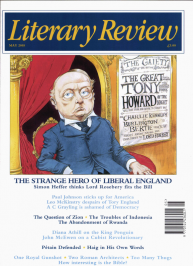Allan Mallinson
He Lunched Alone
Douglas Haig: War Diaries and Letters 1914–1918
By Gary Sheffield and John Bourne (ed)
Weidenfeld & Nicolson 650pp £25
It is baffling how Haig’s command is picked over, usually unsympathetically, and often by people with no understanding of what Clausewitz called ‘friction’ (that element in war which contrives to make simple things difficult), while the politicians’ handling of the long Edwardian prelude to August 1914 is set aside. It is as if Asquith and then Lloyd George – and all those before them – had said (to use a phrase beloved of Mr Blair with regard to Iraq), ‘we must draw a line under this and move on’. The Great War hardly came out of a clear blue sky, even though the assassin’s bullet in Sarajevo was the spark. Yet there was no formal British treaty alliance with France against the Central Powers, only an ‘understanding’ known as the Entente Cordiale (whose centenary was celebrated – if that word is appropriate – last year), and the consequent (but politically unauthorised) Anglo-French staff talks. There was no treaty obligation on Britain to guarantee Belgium’s independence, let alone her territorial neutrality, only a long-standing obsession with not allowing a hostile power to take possession of the Scheldt estuary: favourable winds and tides had once humiliated the nation when the Dutch had burned our ships in the Medway. In failing to think through the worst political-strategic case of the legacy of the Congress of Vienna, Britain found herself at war not so much with an army (and navy) as with a militarised state, and in the worst possible circumstances – the wrong place, with too small an army, and inadequate means to expand it.
In their otherwise excellent and succinct introduction to these diaries, Gary Sheffield and John Bourne, academics of impeccable military-history credentials, exculpate the ‘frocks’, no doubt unintentionally: ‘When the war began, no one could have predicted that Great Britain would become a major military power…’ On the contrary: they most certainly

Sign Up to our newsletter
Receive free articles, highlights from the archive, news, details of prizes, and much more.@Lit_Review
Follow Literary Review on Twitter
Twitter Feed
Alfred, Lord Tennyson is practically a byword for old-fashioned Victorian grandeur, rarely pictured without a cravat and a serious beard.
Seamus Perry tries to picture him as a younger man.
Seamus Perry - Before the Beard
Seamus Perry: Before the Beard - The Boundless Deep: Young Tennyson, Science, and the Crisis of Belief by Richard Holmes
literaryreview.co.uk
Novelist Muriel Spark had a tongue that could produce both sugar and poison. It’s no surprise, then, that her letters make for a brilliant read.
@claire_harman considers some of the most entertaining.
Claire Harman - Fighting Words
Claire Harman: Fighting Words - The Letters of Muriel Spark, Volume 1: 1944-1963 by Dan Gunn
literaryreview.co.uk
Of all the articles I’ve published in recent years, this is *by far* my favourite.
✍️ On childhood, memory, and the sea - for @Lit_Review :
https://literaryreview.co.uk/flotsam-and-jetsam